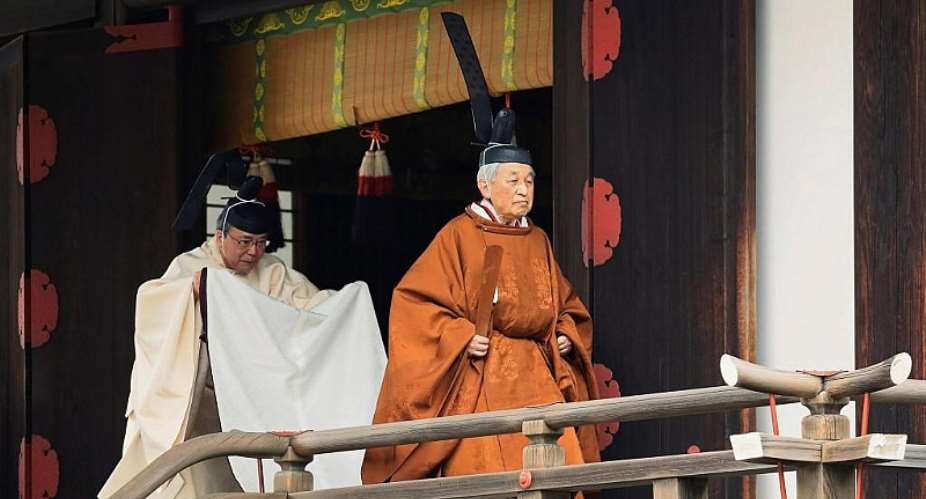As Emperor Akihito vacates the throne, Japan exits the Heisei era of "achieving peace" and enters the Reiwa era of “auspicious calm”. It's unclear what will become of the pacifist legacy of outgoing emperor, amid a drive by Prime Minister Shinzo Abe to expand Japan's military ambitions.
During his three decades as emperor, Akihito saw Japan through the economic crash of the 1990s, as well as the unimaginable triple tragedy that was the earthquake, tsunami and nuclear crisis of 2011.
His style was different to that of other emperors, says Jeff Kingston, the director of Asian studies at Temple University in Tokyo. And despite rules preventing him from expressing political opinions, he was able to get his voice heard.
“He was quite the activist, reinventing the role of the emperor and engaging in diplomacy by trying to promote reconciliation, crisscrossing the region and offering remarks of remorse and prayers for the dead. And I think that made a big positive impression,” Kingston says.
“We've had a year and a half of outpouring of nostalgia about Heisei … Akihito was very admired for carving out a role as consoler-in-chief. He taught the Japanese people the importance of seizing the nettle of history and of taking moral responsibility – and of making gestures of contrition.”
The 85-year-old son of the wartime emperor Hirohito spent much of his time on the Chrysanthemum Throne atoning for the wartime sins of the past. However while Heisei brought moments of national grief and struggle, more than anything it brought great peace, says Agathe l'Homme, a Japan specialist and geopolitical risk analyst with KPMG.
“Sure, Heisei was a challenging era that burst the bubble of Japan's leading economic role in the world. But even though was marked economic recession and environmental and manmade disasters, it was also the era that saw Japanese culture recognised worldwide and boosted quality of life to amongst the highest in the world," l'Homme says.
Rise of Japanese militarism
Times have changed since Japan's catastrophic World War II defeat, after which it laid down its arms and renounced war in favour of pacifism. These days, spurred on by threats from China and North Korea, Prime Minister Shinzo Abe has been busily building up the country's military.
It's a situation that's seen Akihito become a kind of accidental dissident, says Kingston: “Japan's political centre of gravity has shifted sharply to the right, and now the conservative political elite favours a revisionist whitewashing history – so actions like Akihito's are dismissed as apology diplomacy, and masochistic history.”
When Akihito's son, Naruhito, ascends the throne on Wednesday at the age of 59, many are wondering what kind of future the Reiwa era will deliver. Naruhito has already said he wants to carry on with his father's work on reconciliation.
Both father and son oppose Abe's push to revise Article 9 of the constitution, which bans Japan from using of force as a means of settling international disputes. “Land, sea, and air forces, as well as other war potential, will never be maintained,” the article explicitly states.
Of course to ward off threats, Japan does have its expanded Self Defence Force, which is itself controversial – with some questioning whether it's in keeping with the constitution.
Japan won't ever give up on Article 9, says l'Homme. “These would be more subtle changes aimed at pushing Japan in a different direction … They're about legitimising the army and they're being brought on by an increasingly challenging situation in East Asia, particularly with North Korea.”
For now, though, most Japanese would prefer that Article 9 remain untouched.





 There’s nothing you can do for us; just give us electricity to save our collapsi...
There’s nothing you can do for us; just give us electricity to save our collapsi...
 Ghanaian media failing in watchdog duties — Sulemana Braimah
Ghanaian media failing in watchdog duties — Sulemana Braimah
 On any scale, Mahama can't match Bawumia — NPP Youth Organiser
On any scale, Mahama can't match Bawumia — NPP Youth Organiser
 Never tag me as an NPP pastor; I'm 'pained' the 'Akyem Mafia' are still in charg...
Never tag me as an NPP pastor; I'm 'pained' the 'Akyem Mafia' are still in charg...
 Your refusal to dedicate a project to Atta Mills means you never loved him — Kok...
Your refusal to dedicate a project to Atta Mills means you never loved him — Kok...
 2024 elections: I'm competent, not just a dreamer; vote for me — Alan
2024 elections: I'm competent, not just a dreamer; vote for me — Alan
 2024 elections: Forget NPP, NDC; I've the Holy Spirit backing me and nothing wil...
2024 elections: Forget NPP, NDC; I've the Holy Spirit backing me and nothing wil...
 2024 elections: We've no trust in judiciary; we'll ensure ballots are well secur...
2024 elections: We've no trust in judiciary; we'll ensure ballots are well secur...
 Performance tracker: Fire MCEs, DCEs who document Mahama's projects; they're not...
Performance tracker: Fire MCEs, DCEs who document Mahama's projects; they're not...
 Train crash: Railway ministry shares footage of incident
Train crash: Railway ministry shares footage of incident
